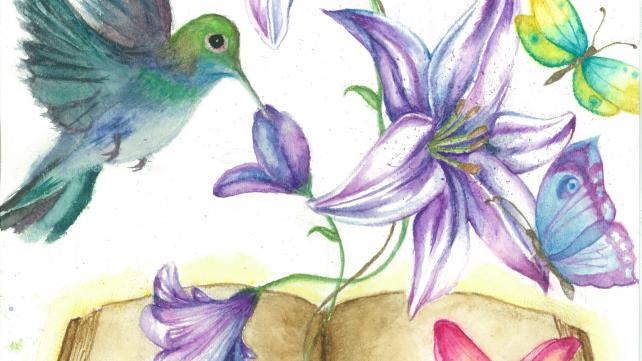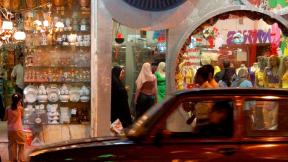
Overview of Positive Psychology and Flourishing
Before diving into the Qur’an, it is important to provide a brief summary of the emerging, and exciting field of positive psychology. Historically, psychology has focused on relieving distressful and disabling psychological symptoms and behaviors. Thus, the traditional goal of psychology has been to ameliorate or mask psychological problems (ie depression, anxiety disorders, schizophrenia, etc). Such significant medical problems often require the involvement of trained medical personal, and at times prescription of medications. However more recently, Martin Seligman, a renowned applied psychologist and author of the book Flourish, argues that psychology as a whole has been missing an important role in society – specifically providing a framework for flourishing. Flourishing as he describes it, is a specific mindset, the result of which comes about by applying and practicing a specific set of prescriptions that have been founded on scientific observations to help make life worth living and promoting well-being. Thus, where psychology has traditionally focused on disease, positive psychology is for everybody, and specifically designed to help all of us achieve well-being.
Initially Seligman, in his book Authentic Happiness, tasked positive psychology with attaining happiness as the ultimate end goal. However, he makes it very clear in Flourish that this way of thinking was naïve, that in fact achieving happiness was actually only one aspect of one of the five components of flourishing (a higher level of well-being). Furthermore unlike happiness, well-being in of itself is not directly measurable, rather it is something that is measured not by attaining one specific thing but enhancing five basic underlying components. These five components have a convenient acronym – PERMA - Positive emotions, Engagement, Relationships, Meaning, and Accomplishment. To flourish, an individual strives towards enhancing/defining the PERMA elements in/for themselves. From this perspective was born the vision of flourishing, grounded in the theory of well-being and ways to optimize one’s life.
Seligman’s theory is rooted in careful and concrete scientific research, thoroughly researched exercises and large representative samples. In other words, he has provided strong support for his approach through real life events and results that make it hard to dismiss positive psychology as just a flash in the pan. What makes it even more appealing, is that throughout his book he gives detailed examples of when positive psychology is used and how well it has been shown to work. In fact, throughout the book, there are several sample tests that the reader is encouraged to take as they read along, allowing them to experience and determine their own level of well-being and ways to improve.
Whether it has been teaching positive psychology to students or teachers, implementing various exercises to tenth graders or positive psychology being used practically by coaches, therapist, parents and even the military, the evidence on its efficacy is very strong, and worth learning about. In fact it just might change your life…well that is indeed the goal.
Even so, there is another very good reason why this book is intriguing and yet oddly familiar for a Muslim. What makes this book from our perspective very enticing to read and understand, is that we think that the PERMA model is well reflected in the Qur’an, and we will try to draw out the parallels between the Qur’an and flourishing:
“Verily We have revealed the book to you in truth for instructing mankind. He that receives guidance benefits his own soul…”
(Surah Az-Zumar, The Crowds, 39:41)
For a Muslim, who reflects on the Qur’an and has read Flourish, the parallels between the two should come as no surprise given that the Qur’an is a social, psychological, and spiritual guide for mankind. Conversely, the current literature on positive psychology may be out of reach for most of you, and thus in this piece we strive to give the Qur’an a contemporary interpretation from the perspective of positive psychology. It is important to note from the outset that this is not an exercise designed to either refute or confirm what is in the Qur’an and/or positive psychology. The Qur’an encourages us to repeatedly “reflect” on its contents – so please consider this as a guided reflection on the Qur’an within a positive psychology framework. At the end we hope that you see the Qur’an as the Muslim’s guide to flourishing.
PERMA model: Concordance with Qur’anic Teachings
Our exercise was to go through each element of PERMA and find verses in the Qur’an that refer to each of these components. Islam as you may well already know, and if not, then soon you will witness, has the natural constructs of positive psychology embedded in the teachings of the Qur’an. Although there are many verses in the Qur’an that speak to each one of these elements, we have chosen a selected few that will put things into perspective.
Positive Emotion
The first element that contributes to wellbeing is positive emotions. This is what we feel. This element encapsulates all human emotions including happiness and life satisfaction that an individual gains from daily living.
Positive psychology, as supported by extensive research has shown that performing positive actions increases positive emotions (happiness) and results in the elevation of our well-being. It has been shown that engaging in acts of kindness, expressing gratitude, and having a positive attitude are key behaviors that contribute to flourishing. For example, building of positive emotions into a school curriculum, amongst the other four elements of positive psychology, involved having kids write gratitude letter to their parents, learning to savor good memories and experiencing how gratifying kindness is to the giver. The results were truly life transforming and many of the valuable qualities could be seen reflected in other aspects of their lives.
Essentially then, it is through acts of giving and kindness that generates the most immediate formation of positive emotions, filling us with vibrant feelings, happiness and peace. Furthermore positive emotions go further than just give pleasant feelings, they are an indication of the accumulation of our psychological growth.
Not only do actions like kindness towards others, speaking warmly to parents, giving charity, or any and all other forms of selfless acts, generate greater “happiness” but every detail, big or small, is significant and like a ripple effect, shapes and contributes to a larger reality. For those with inquisitive minds, this process is further discussed in length in another piece, “Butterflies in Islam: Why a Little is Alot”.
Now although the Qur’an does not necessarily speak to positive emotions (happiness) in of itself, there are certainly countless references that encourage us towards acts of giving and expressing small kindnesses. In particular, the following surah undeniably conveys a very strong and powerful message, one that imbues the importance and breadth of these very actions. Equally incredible is the notion that “giving” is not constrained by the shape or size of the acts, rather these efforts fall under a broad spectrum of actions.
“HAST THOU ever considered [the kind of man] who gives the lie to all moral law? Behold, it is this [kind of man] that thrusts the orphan away, and feels no urge to feed the needy. Woe, then, unto those praying ones whose hearts from their prayer are remote, those who want only to be seen and praised, and, withal, deny all assistance [to their fellow-men]!”
(Surah Al-Ma’un, The Small Kindnesses)
Importantly these acts themselves are not conditional upon receiving something in return (altruism), rather we are encouraged as Muslims to find it in ourselves to adopt these qualities and exercise them. We are encouraged to be altruistic because it is healthy for us (positive emotion) and good for society (i.e. feeding the poor).
“Behold God enjoins justice, and doing of good, and generosity towards (one’s) fellow-men…”
(Surah An-Nahl, The Bee, 16:90)
"They give food, out of love for Him (Allah), to the poor, the orphan, and the slave, saying: We feed you only for Allah's pleasure - we desire from you neither reward nor thanks."
(Surah Al-Insan, The Man, 76:8-9)
The Qur’an is rife with ayahs that encourage giving in a way that inherently entails embracing an altruistic nature. The prescriptions of the Qur’an thus provide a path towards greater well-being (happiness) and a path towards flourishing.
Engagement
This second element is about engagement. More specifically, it speaks to a concept of flow. Flow is something that we all have likely experienced at least once or several times, and if you are lucky you experience it on a daily basis: think back to a time where you were completely immersed in an activity with pure focused motivation, where time stood still for you, where you lost all awareness of your surroundings, of hunger, thirst, and other bodily functions. If you have experienced anything remotely close to this or some version of this, then you have essentially experienced flow.
There are several examples in the Qur’an that have been prescribed to the believers that require engagement. You will notice that each of the following actions are self-sustaining given that flow is practiced, placing our best effort into each one.
“And establish prayer at the two ends of the day and at the approach of the night. Indeed, good deeds do away with misdeeds. That is a reminder for those who remember.”
(Surah Hud, Prophet Hud, 11:114)
The five daily prayers naturally establish engagement in the action of consciously connecting with Allah. Complete concentration void of any external interruptions allows the individual to fulfill their obligations. Further, it allows for internal reflections, and the comfort of being linked to God. This religious practice like many others is not only self-sustaining but it also provides self-discipline.
“O you who have believed, decreed upon you is fasting as it was decreed upon those before you that you may become righteous”
(Surah Al-Baqarah, The Cow, 2:183)
Fasting in the month of Ramadan brings a plethora of benefits be they physical, mental and spiritual (reviewed in Ramadan: A Meal for Your Brain), but it is an amazing time for being in the flow. The self-discipline and engagement that goes into fasting can be challenging, but since we know we can bear it, we have two key ingredients of being in the flow: a challenging task with the knowledge you can achieve it:
“God does not burden any human being with more than he is well able to bear…”
(Surah Al-Baqarah: The Cow, 2:286)
Continuing daily life while fasting encourages us to constantly test our limits and push ourselves to work at our best. Like prayers, this form of worship naturally provides an opportunity to be in the flow. We not only grow spiritually but realize the extent of our capacity opens opportunities for positive change and greater achievements in all spheres of daily living.
“Surely, with every difficulty there is relief. So when you have finished (with your immediate task), still strive hard, (then toil).”
(Surah Al-Inshirah, The Expansion, 94:6-7)
Furthermore, these verses from the Qur’an convey all too well that beyond religious practices, all facets of our lives become opportunities for being in the flow (‘still strive hard’) – be it at work, play, with family, and other social activities. In the most simplistic way then, we are truly motivated to strive to the best of our abilities and in effect accomplish all that we can. Essentially, these verses encourage us to push our limits and be in the flow.
Relationships
The third element contributing towards a path of greater well-being involves building and sustaining positive relationships. Positive psychology to a large extent is about other people. Seligman describes other people “to be the best antidote to the downs of life and the single most reliable up”. It is a firm belief that human survival depends on collective abilities, the ability to join together with others in purpose and towards accomplishing goals collectively. Positive psychology advocates active constructive responding, creating the skills to maintain trust and safety, friendship and intimacy, increasing honesty, being able to have supportive conversations etc…, traits that need to be embraced, implemented and sustained throughout life in order to have a chance at maintaining healthy relationships.
Central to Islam is the concept of Tawhid (Oneness of God). The natural corollary to this is that we are all part of a singular creation, our lives are inextricably linked to one another, our pasts presents and futures are all entangled:
“O mankind! We have created you from a male and a female, and made you into nations and tribes, that you may know one another…”
(Surah Al-Hujurat, The Rooms, 49:13)
Because of these relationships, we are given guidance on how to navigate the various forms of them. This has been beautifully discussed in Toshihiko Izutsu’s fabulous book entitled God and Man in the Qu’ran, which we encourage everybody to read.
The Qur’an surveys how to build strong lasting relationship with:
Your parents:
“And your Lord has decreed that you not worship except Him, and to parents, good treatment. Whether one or both of them reach old age [while] with you, say not to them [so much as] 'uff' [i.e., an expression of irritation or disapproval] and do not repel them but speak to them a noble word. And lower to them the wing of humility out of mercy and say: 'My Lord! Have mercy upon them as they brought me up [when I was] small.”
(Surah Al-Isra: The Children of Israel/Night Journey, 17:23-24)
Your spouse:
"..And one of His signs is that He created mates for you from yourselves that you may find rest in them and He put between you love and compassion; most surely there are signs in this for a people who reflect."
(Surah Ar-Rum: The Romans, 30:21)
Your children:
“…kill not your children because of poverty – We provide sustenance for you and for them.”
(Surah Al-An’am, The Cattle, 6:151)
The needy:
“Righteousness is not that you turn your faces toward the east or the west, but [true] righteousness is [in] one who believes in Allah, the Last Day, the angels, the Book, and the prophets and gives wealth, in spite of love for it, to relatives, orphans, the needy, the traveler, those who ask [for help], and for freeing slaves; [and who] establishes prayer and gives zakah; [those who] fulfill their promise when they promise; and [those who] are patient in poverty and hardship and during battle. Those are the ones who have been true, and it is those who are the righteous.”
(Surah Al-Baqarah: The Cow, 2:177)
An acquaintance:
“The believing men and believing women are allies of one another. They enjoin what is right and forbid what is wrong and establish prayer and give charity and obey Allah and His Messenger.”
(Surah Al-Tawba: Repentance, 9:71)
Even during times of war, the Qur’an is very transparent in providing the necessary guidelines on how to deal with that relationship:
“Fight in the cause of Allah those who fight you, but do not transgress limits; for Allah loves not transgressors.”
(Surah Al-Baqarah: The Cow, 2:190)
There is a must see TED talk which touches upon this topic by Leslie Hazelton entitled On Reading the Koran.
Interestingly but not the least bit surprising is that there is a common element among all these interactions, which is the encouragement to think and act empathetically, and with warmth towards others. Thus, the Qur’an once again provides a full scope on how we have the ability to lead thriving relationships given that we reflect and implement on its guidance.
“To each is a goal to which Allah turns him; then strive together (as in a race) towards all that is good…”
(Surah Al-Baqarah: The Cow, 2:148)
In addition to immediate and personal relationships, the Qur’an also encourages relationships in the broader sense of a community and a larger social network. Our social surroundings are fertile ground that allow us to be our best, especially if we engage one another in healthy relationships to achieve common goals. The implications and necessity of forming such community “networks” is further explained in "Small-world" networking in the Qur'an.
Meaning and Purpose
The fourth element involves a sense of meaning to life. A meaningful life encompasses belonging to and serving something that is greater than the self. This is an “easy” one, since we are told:
“Did you then think that We created you in vain, and that you would not be returned to us?”
(Surah Al-Mu’minun: The Believers, 23:115)
The easy part comes from the fact that:
“There has come to you from God a light and a luminous Book, through which God, by His grace, guides all who seek His good pleasure on the path of peace, and brings them out of the depths of darkness into light and guides them unto a Straight Path.”
(Surah Al-Ma’ida: The Table Spread, 5:15-16)
Our purpose is to implement the prescriptions in the Qur’an towards a life of peace and the straight path. Attainment of peace and the straight path are through application of what is in the Qur’an, with bedrock of that action being our iman which arises from accepting the ayat (signs) of the Qur’an as truth and applying them.
One of the many purposes and a timely one, that we wish to highlight, is that we as Muslims have been given the responsibility of stewards of this Earth. We are encouraged to protect that which we have been allowed to borrow from Allah’s creation. Hence being mindful of the environment and actively promoting its sustainability is an obligation and purpose that we all must uphold.
“And it is He (God) who has made you successors/stewards upon the earth and has raised some of you above others in degrees [of rank] that He may try you through what He has given you. Indeed, your Lord is swift in penalty; but indeed, He is Forgiving and Merciful."
(Surah Al-An’am: The Cattle, 6:165)
Another concept to consider is the idea of wealth. With respect to money, in the eyes of positive psychology, the goal of wealth is not to produce more wealth but to engender flourishing and increase one’s well-being. Research has shown that the quality of life one experiences does not always go hand in hand with material and monetary value; that the richest American are no more “happier” than the middle class. One very crucial reason is because our well-being is comprised of more than just accumulating wealth. Instead, in order to achieve prosperity, and this by no means suggests solely monetary value but rather a broader spectrum of “success”, the wealth we accumulate in life should be used towards catalyzing our purpose.
“Those who spend their wealth for increase in self-purification, And have in their minds no favor from anyone for which a reward is expected in return. But only desire to seek for the Countenance of their Lord Most High; And soon they will attain (complete) satisfaction.”
(Surah Al-Layl: The Night, 92:18-21)
Accomplishment
Lastly, we come to the final component essential in the path to flourishing, which is the notion of accomplishment. How much effort and time we place in performing a task determines the level of achievement that we can reach. Self-discipline is a character trait that enables an individual to devote time and effort in achieving goals. It is a valuable skill to have and to exercise in all aspects of daily living.
There has been research done in self-discipline and academic performance of high school kids. The findings suggest, keeping all other variables constant, that self-discipline is a more accurate measure and representation of student performance than IQ scores. However, it doesn’t stop there, self-discipline has been shown to impact achievement beyond grades and academic performance, far reaching the various sphere of life, one such example being weight control.
Grit is a form of self-discipline that involves a combination of very high persistence and high passion for an objective. Spending more time on a task leads not to an additive but a multiplicative progress towards a goal. This relationship has been tested with high school students, university students and the military, all coming to the same conclusion. Those with more grit and self-discipline tend to succeed and progress forward.
“No one will be granted such goodness except those who exercise patience, none but persons of the greatest good fortune.” (41:35- Ha-mim: Explained)
The Islamic practices of daily prayers, annual fasting in Ramadan, and recitation of the Qur’an to name a few are all self-sustaining habits that imbue self-discipline. In the “real” world we are encouraged to have self-discipline and work towards our goals, and not to expect them to fall into our laps with simply saying inshaAllah:
“That man can have nothing but what he strives for; that (fruit of) his striving will soon come in sight. Then will he be rewarded with a reward complete”
(Surah An-Najm: The Star, 53:39-41)
“Surely, with every difficulty there is relief. So when you have finished (with your immediate task), still strive hard, (then toil).”
(Surah Al-Inshirah: The Expansion, 94:6-7)
Thus in Islam, accomplishment is merited on how much effort is put into reaching one’s goal. This goal not only refers to applying the prescriptions in the Qur’an but as well to all that we do – our work, our play, and our relationships.
Conclusion
We hope that the information provided here is a beginning to understanding how the Qur’an is the Muslim’s guide to flourishing. It encapsulates the PERMA elements, and provides concrete exercises (see Appendix for the interested reader) to operationalize PERMA within an Islamic perspective. However, the prescriptions in the Qur’an are generic, much like positive psychology and can be seen in a secular light, suggesting the universality of the Islamic approach towards flourishing:
“….Allah intends for you ease and does not intend for you hardship…..”
(Surah Al-Baqarah: The Cow, 2:185)
We encourage the reader to read Martin Seligman’s Flourish, along with the Qur’an for a more comprehensive understanding of how the two are related. It is only through knowledge that the things in the Qur’an become manifest, and with this knowledge we can then reflect upon the things around us, and our life experiences.
“Those who listen to the Word, and follow the best of it: those are the ones who Allah has guided, and those are the ones endowed with understanding.”
(Surah Az-Zumar: The Crowds, 39:18)
We hope to have begun a process to change how one approaches the Qur’an - not as a book of rules, and restrictions - but as a guide for flourishing. In this process we see the Muslim’s life not one of fear of repercussion, but a lifelong path towards increased positive emotions, engagement, healthy relationships, a profound sense of meaning, and as an agent of positive personal and social change (accomplishment).
----------------------------------------------
Taufik A Valiante MD PhD FRCS is an Associate Professor in Neurosurgery and the Institute of Biomaterials and Biomedical Engineering, at the University of Toronto. He is the Co-Director of the Epilepsy Program, specializes in Epilepsy Surgery, and is a Scientist at the Krembil Research Institute. He finds great positive emotion in attempting to understand brain function in health and disease.
Sumayya Mehmood is a Masters Student in Dr. Valiante Lab, and is developing interventions to improve the quality of life of individuals with medically refractory epilepsy undergoing brain surgery to ameliorate their seizures. She is also the creator of the artwork that accompanies this piece.
Artwork Credit: Sumayya Mehmood
© Sound Vision Foundation
Note: Please share this article using our share buttons below. However, for permission to distribute electronically or in print, please send an email to Copyrights@SoundVision.com. Thank you.








Comments
I absolutely love this! Such
I absolutely love this! Such depth and wisdom - I'm off to get a copy of Flourish. Thank you!
Way too much sugar for me.
Way too much sugar for me. That's the American cultural influence. Islam accommodates many cultures. It can be sweet but also includes much more. It is not an argument for productivity or for capitalism, or for monarchy and obedience. Above all it is God centered, not self centered. We can value self actualization but love is experienced beyond dictates and discipline. There is mystery in wisdom, and humility, and beauty.
This is a magnificent article
This is a magnificent article. This is where we need to take our Islam. You guys are the real Islamic scholars who see Islam in its true light. May Allah(swt) reward you accordingly
Location
Good
Good
Add new comment